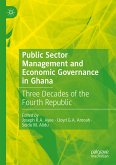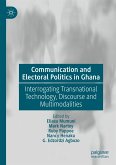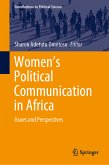This book is one of two volumes that examines the successes and failures of the Ghanaian Fourth Republic from a political, public administration and public policy viewpoint. Published to coincide with the thirtieth anniversary of the founding of the Fourth Republic, these volumes bring together leading scholars to consider the political achievements and failures that have taken place in the country since the early 1990s, and what these tell us about the state of politics and democracy in twenty-first century Ghana and beyond. This volume focuses on party politics, political communication and public policy. It assesses themes such as interest groups, electoral politics, democratization, constitutionalism, the role of the media, and gender and politics. The volume also places Ghana in a global context, demonstrating how lessons learnt from the country can be applied elsewhere around the world, and what is unique about the Ghanaian political experience. It will appeal to all those interested in public policy, public administration and African politics.
Joseph R.A. Ayee is Professor at the Department of Political Science, University of Ghana. He is also Vice President at the Ghana Academy of Arts and Sciences.
Lloyd G.A. Amoah is Senior Lecturer at the Department of Political Science and Director of the Centre for Asian Studies, University of Ghana.
Seidu M. Alidu is Associate Professor and Head of Department of Political Science, University of Ghana.
Dieser Download kann aus rechtlichen Gründen nur mit Rechnungsadresse in A, B, BG, CY, CZ, D, DK, EW, E, FIN, F, GR, HR, H, IRL, I, LT, L, LR, M, NL, PL, P, R, S, SLO, SK ausgeliefert werden.
Hinweis: Dieser Artikel kann nur an eine deutsche Lieferadresse ausgeliefert werden.









